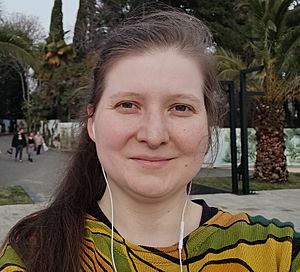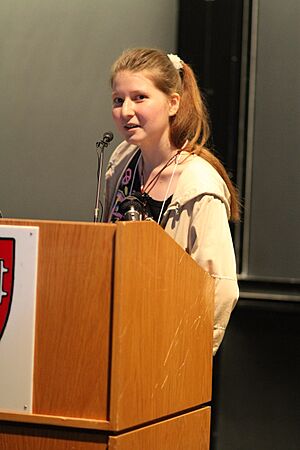Alexandra Elbakyan facts for kids
Quick facts for kids
Alexandra Elbakyan
|
|
|---|---|
| Александра Элбакян | |

Elbakyan in 2021
|
|
| Born | 6 November 1988 |
| Nationality | Kazakhstani |
| Alma mater | |
| Occupation |
|
| Known for | Sci-Hub and Sci-Net |
| Movement | Open Access |
| Scientific career | |
| Fields | Neural engineering, Computer science |
Alexandra Elbakyan (born on November 6, 1988) is a computer programmer from Kazakhstan. She is famous for creating Sci-Hub. This website gives free access to many research papers.
Sci-Hub helps people read scientific articles without paying. In 2018, a study showed that Sci-Hub had almost all scholarly articles. Because of her work, Alexandra has been called "Science's Pirate Queen." In 2016, Nature magazine named her one of the top ten "people who mattered" in science. She has lived in Russia since 2011.
Contents
Early Life and Computer Skills
Alexandra Elbakyan was born in Almaty, which was then part of the Soviet Union. This was on November 6, 1988. She has a mixed background, with Armenian, Slavic, and Asian family roots. Her mother, who was also a skilled computer programmer, raised her.
Alexandra started learning to program when she was just 12 years old. She began by making web pages using HTML. Later, she learned other programming languages like PHP and Assembly. She even tried to create a Tamagotchi toy that could think using artificial intelligence.
First Computer Hacks
When she was 14, Alexandra performed her first computer "hack." She used a method called SQL injection to get access to usernames and passwords. These belonged to her home internet provider. She found more weaknesses in their system. She told the provider about these problems, hoping to get a job. However, they ended up cutting off her internet service instead.
At 16, Alexandra hacked a publisher's website. This was MIT Press, which published online books about neuroscience. These books were very expensive, and she could not afford them. So, she wrote a program to download the books for free.
Education and Research
In 2009, Alexandra earned a degree in computer science. She studied at the Satbayev Kazakh National Technical University. Her focus was on information security. For her final project, she explored using brainwaves for security instead of passwords. During this time, she realized how hard it was to get scientific articles. Her university did not have access to many papers she needed.
Brain-Computer Interfaces
Alexandra became very interested in brain–computer interfaces. These are ways to connect brains with computers. In 2010, she joined the University of Freiburg in Germany to work on a project. This led to an internship in neuroscience in the United States.
That same year, she spoke at a conference at Harvard University. Her talk was about connecting brains and computers. She also presented her ideas at another conference in Arizona. She explored how human and machine minds could merge.
Later Studies
From 2012 to 2014, she was a master's student in Moscow. She later left that program. In 2016, she was studying the history of science. Her goal was to understand how scientific information is shared. More recently, she has studied religious topics. In 2019, she earned a master's degree from Saint Petersburg State University. Her studies focused on biblical languages.
Sci-Hub: Free Access to Science
Alexandra Elbakyan created Sci-Hub in 2011 while living in Kazakhstan. She believes Sci-Hub helps connect the minds of many researchers. She first made the website to quickly and easily access academic papers. She did not initially plan to make all science free.
Why Sci-Hub Was Created
In 2015, a big publisher called Elsevier sued Sci-Hub in the US. Alexandra wrote a letter to the judge. She explained why she started Sci-Hub. She needed hundreds of papers for her research but could not afford them. So, she found ways to get them for free. She created Sci-Hub to help others in the same situation.
She argued that publishers like Elsevier do not write the papers. They also do not pay the authors. She believes that research papers should be free for everyone. Many scientists agree that research should be "open access."
Legal Challenges and Support
The court ordered Sci-Hub to pay $15 million in damages. After this, Alexandra stayed out of public view to avoid legal issues. Other publishers and countries also filed lawsuits against Sci-Hub.
As of early 2023, a court in India did not dismiss a request to block Sci-Hub. However, Alexandra's lawyers are working on new legal plans. Also, a Sci-Hub website domain that was taken down has now been restored. This happened after a successful "ownership verification."
Alexandra's Beliefs
Alexandra Elbakyan strongly supports the open access movement. She thinks Sci-Hub is a true example of open access in science. She believes science should be open to everyone, not hidden behind payment walls.
She sees herself as a "pirate" when it comes to information. She thinks copyright laws stop people from freely sharing information and knowledge online. In 2018, she asked Sci-Hub supporters to join a Pirate Party. These parties work to change copyright laws.
Sharing Knowledge for Progress
Alexandra is inspired by the idea of communism. She believes that ideas should be shared by everyone. This is important for scientific progress. In a 2016 interview, she said that knowledge should be common property. She feels this is especially true for scientific articles. She believes Sci-Hub is fighting for shared knowledge in science. She thinks knowledge should not be private property of companies.
Alexandra does not consider herself a strict Marxist. She wanted to join a political party in Russia. However, she could not because she is not a Russian citizen.
She also says that not having free access to scientific knowledge goes against a human right. This is Article 27 of the United Nations’ Universal Declaration of Human Rights. It says everyone has the right to share in scientific progress.
Recognition and Awards
In December 2016, Nature magazine named Alexandra Elbakyan one of the 10 most important people in science that year. Some researchers who use Sci-Hub even thank her in their papers.
Many people see Alexandra as a hero for creating Sci-Hub. Nobel Prize winner Randy Schekman called her a hero. Ars Technica compared her to Aaron Swartz, another person who fought for free information. The New York Times compared her to Edward Snowden. Edward Snowden himself said Sci-Hub is one of the most important websites for academics. She has also been called a modern-day "Robin Hood" and "Science's Pirate Queen."
Species Named in Her Honor
Several new animal and plant species have been named after Alexandra Elbakyan:
- Idiogramma elbakyanae: A type of parasitoid wasp discovered in 2017.
- Brachyplatystoma elbakyani: An extinct species of catfish found in 2020.
- Spigelia elbakyaniae: A flowering plant from Mexico discovered in 2020.
- Amphisbaena elbakyanae: A type of worm lizard discovered in 2021.
- Sibogasyrinx elbakyanae: A deep-sea snail found in 2021.
- Hyloscirtus elbakyanae: A species of frog.
Alexandra was nominated twice for the John Maddox Prize. Some researchers believe she deserves a Nobel Prize for her work. A wildlife scientist, T R Shankar Raman, said she definitely qualifies for a Nobel Prize. This is because the prize is for those who have greatly benefited humankind.
In 2023, Alexandra received an award from the Electronic Frontier Foundation. This award was for her important work in making sure technology supports freedom and justice for everyone.
Works
- Elbakyan, Alexandra (2009) "Human EEG as a biometric feature in access control systems" Bachelor Thesis, Satbayev University.
- Elbakyan, Alexandra (2019) "Image of the Holy Spirit in Hebrew Bible texts" Master Thesis, Saint Petersburg State University.
See also
 In Spanish: Alexandra Elbakyan para niños
In Spanish: Alexandra Elbakyan para niños
- Aaron Swartz
- Anna's Archive
- Copyright abolition
- ICanHazPDF
- Library Genesis
- Open Access
- Peter Sunde
- Z-Library
 | Calvin Brent |
 | Walter T. Bailey |
 | Martha Cassell Thompson |
 | Alberta Jeannette Cassell |


